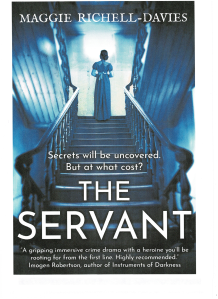Tags
Bath Novel Award, Blue Pencil Agency First Novel Prize, Bridport Prize, Colm Toibin International Short Story Award, Frome Festival Short Story, Peggy-Chapman Andrews First Novel Award, The Chairman's Prize, The Poetry London Prize, The Sitcom Mission, The Times/Chicken House Children's Fiction Competition, Writing Magazine Competitions, Yeovil Literary Prize
STOP PRESS: Maggie Richell-Davies’ novel, The Servant, is now available on Amazon – and was only published because she entered and won the HWA/Sharpe Books 2020 Unpublished Novel Award. Competition details were posted on on this blog, so that could have been YOU! https://amazon.co.uk/dp/B087SD83VV
With so many of us in lock-down, and experts saying book reading can boost the brain and relieve depression, it is up to us to keep making up stories until the happy day when we can again spend time in our favourite coffee shop.
The Times/Chicken House Children’s Fiction Competition for new writers. The winner receives a publishing contract with Chicken House Books, with an advance of £10,000 and the offer of literary representation from Kate Shaw of the Shaw Agency. They are additionally running The Chairman’s Prize, which is given to a manuscript hand-picked by Chicken House publisher Barry Cunningham. The winner gets a publishing contract and £7,500, plus the offer of representation by Kate Shaw. Writers must be unpublished and unagented, with BAME authors particularly encouraged to apply. Enter original, unpublished novels for children of any age between 7 and 18, plus a synopsis. Entry fee: £18. Closing date: 4 May. Details: http://www.chickenhousebooks.com
The Poetry London Prize is for original, unpublished poems up to 80 lines. Prizes: £5,000; £2,000; £1,000. Entry fee £4 for Poetry London subscribers and £8 for non-subscribers. Closing date: 1 May. Details: https://poetrylondong.co.uk/
Fancy yourself as a scriptwriter? The Sitcom Mission is open to submissions for a fifteen-minute sitcom script with a ‘bold and exciting central character or characters’, good dialogue and the catalyst of an exciting incident to kick-start the story. Plus, of course, it needs to be funny. A good script should get your work in front of major industry professionals. Entry fee is £10 and the deadline is 11.59pm on 3 May. Check out the submission details: http://www.comedy.co.uk/sitcom_mission/info/
Bath Novel Award 2020. First 5,000 words, plus single page synopsis. Open to unpublished, self-published, and independently published authors. £3,000 first prize, plus manuscript feedback and agent introductions to shortlisted authors. Entry fee: £28. Deadline 31 May. Details: bathnovelaward.co.uk
Colm Toibin International Short Story Award. Short stories 1,800-2,00 words. Prizes: 700 Euros; 500 Euros; 300 Euros. Entry fee: 10 Euros. Closing date: 13 May . Details: http://www.wexfordliteraryfestival.com [Note: a member of ninevoices won this last year. Why not you, this year?]
Blue Pencil Agency First Novel Prize. The first chapter of an unpublished novel, up to 5,000 words. Prize: £1,200 in prizes, manuscript review, introduction to judge, literary agent Nelle Andrew. Entry fee: £20. Closing date 31 May. Details: http://www.bluepencilagency.com
Frome Festival Short Story. Short stories 1,00 to 2,200 words. Prizes: £400; £200; £100. Entry fee: £8. Closing date: 31 May. Details: http://www.fromeshortstorycompetition.co.uk
The Bridport Prize – Peggy Chapman-Andrews First Novel Award for 5,000-8,000 words, plus 300 word synopsis. Must be unpublished, unagented and unplaced in any other competition. First prize £1,500 plus mentoring and agent introduction. Runner-up £750, plus mentoring and agent introduction. Three shortlisted writers receive £150, plus inclusion in anthology. Entry fee: £20. Deadline: 31 May. Details: bridportprize.org.uk
The Bridport Prize – Poetry for up to 42 lines. Must be unpublished, unagented and unplaced in any other competition. Prizes: £5,000, £1,000, £300, 10x£100. Entry fee: £10. Deadline: 31 May. Details: bridportprize.org.uk
The Bridport Prize – Short Story for stories up to 5,000 words. Must be unpublished, unagented and unplaced in any other competition. Prizes:£5,000, £1,000, £300, 10x£100. Entry fee: £12. Deadline: 31 May. Details: bridportprize.org.uk
Yeovil Literary Prize for novels (opening chapters and synopsis, up to 15,000 words). Short stories: maximum 2,000 words. Poems up to 40 lines. Writing Without Restrictions. Western Gazette Best Local Writer. Prizes Novel £1,000; £250; £100. Short story and poetry: £500; £200; £100. Writing without restrictions: £200; £100; £50. Local prize: £100. Entry fee: novel £12; short story £7; poetry £7, £10 for two, £12 for three. Writing Without Restrictions: £5. Closing date 31 May. Details: http://www.yeovilprize.co.uk
And don’t forget that the invaluable Writing Magazine – still winging its way to subscribers and also available on-line – holds its own regular writing competitions and provides details of many available elsewhere.
Forgive me if, in these troubled times, any of the above details turn out to be inaccurate. So, do check them on-line before entry.
Good luck!













